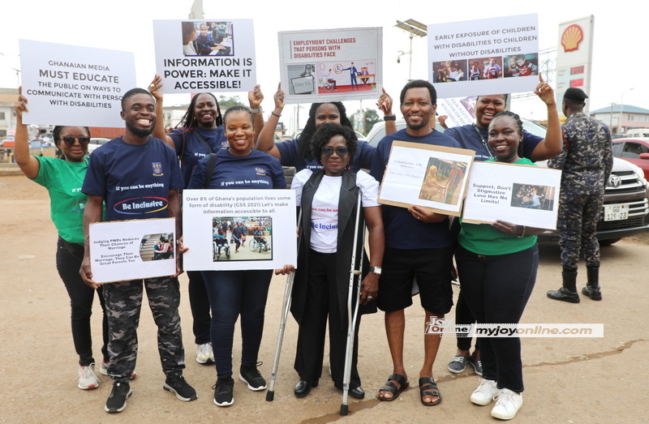Students from the University of Ghana’s Department of Social Work on Saturday held a sensitisation campaign at the Madina Market to highlight the challenges faced by persons with disabilities.
The outreach, led by Professor Augustina Naami of the Department of Social Work, drew more than 26 participants, including Aba Lokko, Public Affairs Director at the University of Professional Studies.
Armed with placards, the students engaged market women, vendors, and pedestrians, educating them about the daily struggles of persons with disabilities and promoting inclusivity. The initiative formed part of the students’ final-year project work, aimed at raising awareness, challenging negative attitudes, and breaking stereotypes.
In Ghana, people with disabilities continue to face barriers such as limited access to education, employment, and healthcare, compounded by poor infrastructure and persistent stigma. The students’ campaign sought not only to foster understanding but also to draw government attention to the urgency of improving conditions.
Speaking to journalists after the exercise, Prof. Naami lamented the neglect of disability issues, noting that much of Ghana’s infrastructure remains unfriendly to persons with disabilities. She called for an amendment to the Persons with Disability Act, 2006 (Act 715), which mandates accessible public spaces and services but is poorly enforced.
“All the streets in Ghana, bus stops, and offices are not disability-friendly,” she said, stressing that the law’s intent is far from reality.
A physically challenged academic herself, Prof. Naami underscored that disability should never be a barrier to achievement, citing her own career as an Associate Professor as an example. She pointed to everyday obstacles such as inaccessible roads, open gutters, obstructed sidewalks, and poorly designed public facilities.
The Madina Market sensitisation was part of a larger project in which students researched, understood, and proposed solutions to the barriers that limit the full participation of persons with disabilities in society. They believe awareness campaigns like this are a vital step toward lasting change.
–
Source: David Andoh|univers.ug.edu.gh





